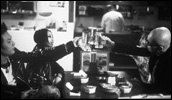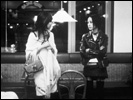Nana
- Year
- 2005
- Original title
- Nana
- Japanese title
- NANA
- Director
- Cast
- Running time
- 113 minutes
- Published
- 3 May 2006



by Adam Campbell
Based on an extremely popular comic book by schoolgirl favourite Ai Yazawa, there was no doubt the big screen version of her hit series Nana was going to rake in the cash at the box office. What was surprising was just how well it did, earning four billion yen and ending up the fourth most successful Japanese film of 2005, with no shame in losing places to new Miyazaki, Pokemon, and Bayside Shakedown films. The theme song by star Mika Nakashima also shot to the top of the single charts, with the other single from the soundtrack right behind in the number two slot. For a live-action, non-nostalgic film free of special effects or teenaged characters dying of some horrible disease, this was quite an achievement.
Nana is actually the story of two Nanas, sultry rocker Nana Osaki (played by sultry rocker Mika Nakashima) and bubbly Nana Komatsu (Aoi Miyazaki), whom Osaki soon dubs Hachi ('eight', since nana means seven). Both girls share a name, an age, and boyfriend trouble. While Hachi has moved to Tokyo to be closer to her childhood sweetheart Shoji (Yuta Hiraoka, the boy in Swing Girls), Nana is seeking to make it as a vocalist in the big city after her old boyfriend Ren (Ryuhei Matsuda) left both her and their old band for greener pastures. After meeting in a series of 7-related coincidences, the girls move in together and begin setting up their new lives.
Now, if this all sounds like the stuff of your average television drama, you would be right. The premise of Nana is as old as they come. This is not even new territory among recent Japanese cinematic endeavours, with Tetsuya Nakashima's hyperactive Kamikaze Girls putting the tough chick and the girly girl on screen together a year previous. Nana is certainly not a flashy film, but Otani's direction is very capable. While some recent Japanese films (Negotiator for instance, which ranked a place above this one in the 2005 box office) have been casually directed to the point of absenteeism, Nana is carefully restrained. For a character based film, Otani is wise to take a step back and allow some of the performances to play out, and some of the film's finest moments are in these longer takes. Fittingly the film features several scenes of observation, usually when the two girls find themselves watching or watching over each other. Otani's framing and timing of these observation shots draw the audience in as well and makes us align with the girl doing the watching. It's the old 'audience as voyeur' but generally speaking not in a seedy way.
Director Kentaro Otani hails from an indie drama background and it shows. That isn't to say his work here is a complete success, many sequences throughout the film seemed careless, but there is at least a human being behind the camera. Recurrent establishing shots of the pure white apartment emphasise the space, freshness, and freedom of the blank canvas the girls have landed on and the only decoration is, tellingly, a poster of Nana's old flame who she can't get over. Jumps in narrative are employed to give some depth to Nakashima's character and history, a cinematic side road around the characters closed personality that comes together nicely to provide the later stages of the film with some emotional impact. The picture also contains some limited use of voiceover, though most of its greatest strengths lie in the unspoken moments. For instance, when a depressed Hachi takes to her bed for a long, justified sob, Nana doesn't bother offering any pointless advice, but rather climbs in with her and provides a comforting arm.
A lot of the right moves to avoid the stereotypical formula for these kinds of movies are refreshingly taken. The film manages to be occasionally moving without having to resort to being as tediously or obviously manipulative as something like Crying Out For Love in the Center of the World (Sekai no Chushin de, Ai o Sakebu, 2004). There are no tragedies in Nana, only very common experiences, and while the film is no hard-hitting realist feature and doesn't take itself too seriously, it's certainly a more genuine movie than tat like the big screen version of Train Man. The relationship presented is something a little different from the norm, obviously helping Hachi but with the benefits for Nana sometimes more subtle. Each girl is a different and generally unrepentant entity. When they do connect, it's thankfully not in a horrific "I can sing, you can dance, let's put on a show!" kind of manner. Hachi does not take to wearing leather nor does she transform Nana into a CanCam reader.
We are also spared almost any Odd Couple moments. Hachi instead is quite taken with her cool roommate and Nana secretly enjoys indulging her. More than the usual movie friendship, Nana verges on a transgender partnership, though it is too reductive to leave it at that. Nana seems to be established as the man and numerous comments are made throughout the film. Hard smoking, tough talking with a masculine swagger, she even builds a table with her bare hands and initiates a kiss with Hachi. However, kudos to all involved, especially Nakashima, for not going all the way down the road of tomboy and keeping Nana a distinctly feminine character. The inevitable betrayal scene which marks the halfway point of the movie manages to muster sympathy without painting any true bad guys. There is a deft hand at work which repeatedly snatches this film away from most pitfalls that were to be expected.
Singer Mika Nakashima gives an understated performance, cool and mature. Playing the pop-rocker must surely come easy, but Nakashima gives a subtle weight to her emotional scenes as well. She has to carry off a dual role, with a more vulnerable character in the past segments than the present ones. Aoi Miyazaki, who has proved her acting chops in the Shinji Aoyama films Eureka and Eli Eli Lema Sabachtani? as well as Akihiko Shiota's Harmful Insect, diversifies here with a more perky role, played very broadly almost into caricature. Yuta Hiraoka successfully fights the script and his short screen time to make a likable character out of Shoji. This is more than can be said for Ryuhei Matsuda, who is certainly talented, but needs to break that blank face once in a while. When paired up against Nakashima, Matsuda comes off more like a grumpy child than the lone-wolf renegade she is meant to be hung up on.
Most of all, I think I'll remember Nana for being surprising. Those of you familiar with the comic book, I'm sorry to say I am not among your numbers so I have no idea how closely this adheres to the source material, but I'm told some minor liberties are taken. Otani hasn't just settled for filming Nana, letting a camera run as people read out a comic book, but has managed to wrestle out from the middle of this media-blitz an engaging and entertaining film in its own right.